By David Pan · Wednesday, July 26, 2023 Telos 203 (Summer 2023): The Manifold Foundations of Human Rights is now available for purchase in our store. Individual subscriptions to Telos are also available in both print and online formats.
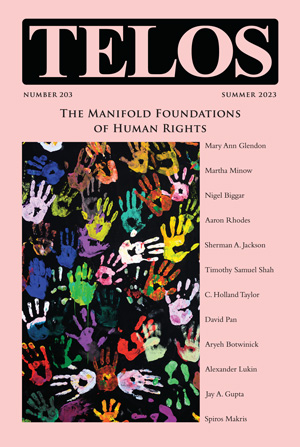 One of the most disappointing human rights debacles in the last few years was the withdrawal of U.S. forces from Afghanistan. For those who still take an interest, the human rights situation there has become horrendous, with Human Rights Watch documenting the denial of schooling and employment to women, extrajudicial killings, and torture. Moreover, in a severe rebuttal to those who supported the withdrawal, Taliban rule has created the conditions for a renewal of terrorist groups that can now develop and train in Afghanistan with impunity. There is also a good case to be made that the U.S. withdrawal there emboldened Putin to invade Ukraine, calculating that the United States and its allies no longer have the stomach for protracted conflicts in order to prevent human rights abuses. It may be that we have traded a low-grade conflict in Afghanistan for a high-intensity one in Ukraine. The lesson here is that the struggle for human rights, while beginning as a moral problem about our common responsibilities, can only be taken seriously when we consider its political ramifications. What do we owe to our fellow humans, and what sacrifices should we make in order to fulfill those responsibilities? One of the most disappointing human rights debacles in the last few years was the withdrawal of U.S. forces from Afghanistan. For those who still take an interest, the human rights situation there has become horrendous, with Human Rights Watch documenting the denial of schooling and employment to women, extrajudicial killings, and torture. Moreover, in a severe rebuttal to those who supported the withdrawal, Taliban rule has created the conditions for a renewal of terrorist groups that can now develop and train in Afghanistan with impunity. There is also a good case to be made that the U.S. withdrawal there emboldened Putin to invade Ukraine, calculating that the United States and its allies no longer have the stomach for protracted conflicts in order to prevent human rights abuses. It may be that we have traded a low-grade conflict in Afghanistan for a high-intensity one in Ukraine. The lesson here is that the struggle for human rights, while beginning as a moral problem about our common responsibilities, can only be taken seriously when we consider its political ramifications. What do we owe to our fellow humans, and what sacrifices should we make in order to fulfill those responsibilities?
Continue reading →
By David Pan · Monday, September 20, 2021 Telos 196 (Fall 2021): Thinking vs. Doing is now available for purchase in our store. Individual subscriptions to Telos are also available in both print and online formats.
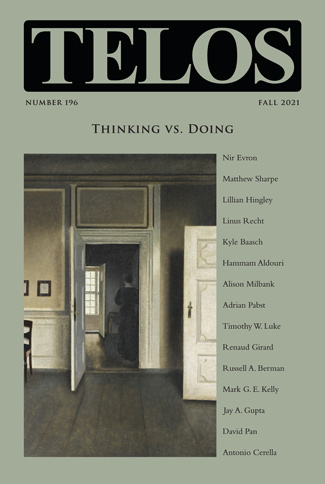 The dichotomy of thinking versus doing seems to arise out of our own sense of the difference between our minds and our bodies. On the one hand, the gap between mind and body is the basis of the perspective with which the mind can step back, criticize, and improve the world. Without this gap, we would be trapped in an eternal present, unable to imagine anything but what currently exists. On the other hand, the dichotomy can lead to a sense of detachment from the world. Such detachment can be negative if it leads to an isolation from the world, or to a sense of alienation if the world is such that its influence on the body becomes oppressive for the mind. The opposition between thinking and doing directs our attention toward this fundamental gap between the mind and the body within the human condition that is the source of both all human achievement as well as human debasement. As we focus on thinking, our detachment from our actions can allow us to make judgments about the wisdom of our actions, but such detachment can also lead us to bury ourselves in contemplation and ignore our responsibilities for acting, or even allow us to act with a kind of cruel coldness in trying to realize an abstract idea. This issue of Telos considers such different possibilities for the way in which we relate our thinking to our actions. The dichotomy of thinking versus doing seems to arise out of our own sense of the difference between our minds and our bodies. On the one hand, the gap between mind and body is the basis of the perspective with which the mind can step back, criticize, and improve the world. Without this gap, we would be trapped in an eternal present, unable to imagine anything but what currently exists. On the other hand, the dichotomy can lead to a sense of detachment from the world. Such detachment can be negative if it leads to an isolation from the world, or to a sense of alienation if the world is such that its influence on the body becomes oppressive for the mind. The opposition between thinking and doing directs our attention toward this fundamental gap between the mind and the body within the human condition that is the source of both all human achievement as well as human debasement. As we focus on thinking, our detachment from our actions can allow us to make judgments about the wisdom of our actions, but such detachment can also lead us to bury ourselves in contemplation and ignore our responsibilities for acting, or even allow us to act with a kind of cruel coldness in trying to realize an abstract idea. This issue of Telos considers such different possibilities for the way in which we relate our thinking to our actions.
Continue reading →
By David Pan · Friday, June 18, 2021 Telos 195 (Summer 2021): Global Perspectives on Constitutionalism and Populism is now available for purchase in our store. Individual subscriptions to Telos are also available in both print and online formats.
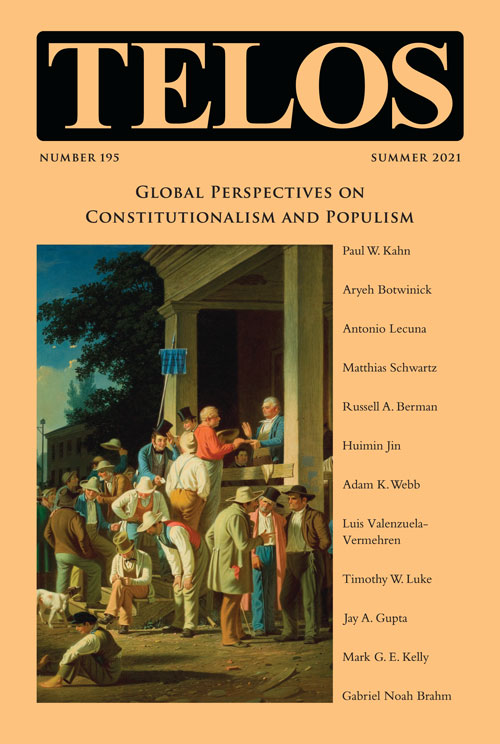 After watching the images of the January 6 Capitol riot, many Americans concluded that right-wing populism threatens the basic rules of our constitutional order. In this view, the U.S. Constitution establishes a universal order that is detached from any particular orientation and provides the neutral ground upon which differences can be discussed, while populists upset the rules of discussion and destroy the basis of a common project. Consequently, since populism is at odds with the Constitution, the solution would be to try to reimpose a measure of rationality upon the unruly. Yet the nagging concern behind this perspective is not just the violation of rules but the suspicion that populism is ultimately motivated by racism and sexism. In this case, the real opposition would not be between constitutionalism and populism but between two understandings of the Constitution, that is, two conceptions of the character of the people, one egalitarian and the other racist. The difficulty is that the laws of a constitution cannot exist independently of a people with a specific history. Rules cannot be neutral but imply a perspective on the world, and the conflict between constitutionalism and populism may in fact be a symptom of a conflict between two factions within the people, each of which is attempting to establish itself as the proper representation of the will of the people as a whole. After watching the images of the January 6 Capitol riot, many Americans concluded that right-wing populism threatens the basic rules of our constitutional order. In this view, the U.S. Constitution establishes a universal order that is detached from any particular orientation and provides the neutral ground upon which differences can be discussed, while populists upset the rules of discussion and destroy the basis of a common project. Consequently, since populism is at odds with the Constitution, the solution would be to try to reimpose a measure of rationality upon the unruly. Yet the nagging concern behind this perspective is not just the violation of rules but the suspicion that populism is ultimately motivated by racism and sexism. In this case, the real opposition would not be between constitutionalism and populism but between two understandings of the Constitution, that is, two conceptions of the character of the people, one egalitarian and the other racist. The difficulty is that the laws of a constitution cannot exist independently of a people with a specific history. Rules cannot be neutral but imply a perspective on the world, and the conflict between constitutionalism and populism may in fact be a symptom of a conflict between two factions within the people, each of which is attempting to establish itself as the proper representation of the will of the people as a whole.
Continue reading →
By David Pan · Friday, December 18, 2020 Telos 193 (Winter 2020): Race, Russia, and Rights is now available for purchase in our store. Individual subscriptions to Telos are also available in both print and online formats.
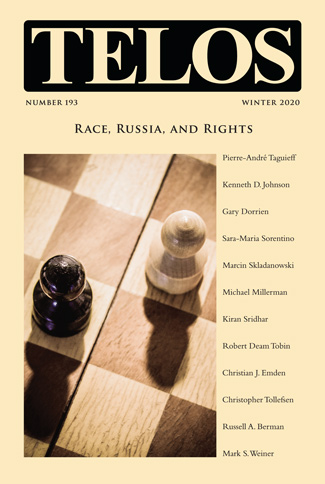 What is not up for discussion? The answer to this question defines a political order, and the repressiveness of such an order will depend on where this boundary is set between the discussable and the undiscussable. But it is not as if more discussion necessarily means less repression. Certain topics—genocide, torture, slavery—definitely need to be off the table as legitimate political measures. Other topics—the choosing of rulers and historical facts—need to be discussable in order to avoid tyranny. In between lies a gray area whose definition will establish the character of each political order. Conversely, a lack of consensus on this issue will lead to political instability that goes beyond the content of political debates, indicating that the question of discussability coincides with the problem of political identity. This issue of Telos will consider three areas in which discussability has become the main issue, leading to implacable conflict. What is not up for discussion? The answer to this question defines a political order, and the repressiveness of such an order will depend on where this boundary is set between the discussable and the undiscussable. But it is not as if more discussion necessarily means less repression. Certain topics—genocide, torture, slavery—definitely need to be off the table as legitimate political measures. Other topics—the choosing of rulers and historical facts—need to be discussable in order to avoid tyranny. In between lies a gray area whose definition will establish the character of each political order. Conversely, a lack of consensus on this issue will lead to political instability that goes beyond the content of political debates, indicating that the question of discussability coincides with the problem of political identity. This issue of Telos will consider three areas in which discussability has become the main issue, leading to implacable conflict.
Continue reading →
By David Pan · Friday, September 25, 2020 Telos 192 (Fall 2020): Truth and Power is now available for purchase in our store. Individual subscriptions to Telos are also available in both print and online formats.
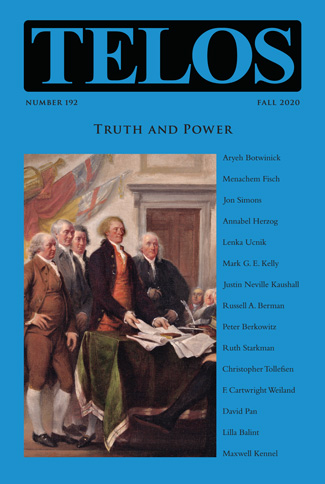 There is a strong temptation to oppose the idealism of truth to the realism of power in order to criticize and turn away from politics as a base pursuit. Science, facts, and ideals are cited as the objective truths that so often are ignored in favor of ideology, lies, and self-interest by those who wield power. Yet this opposition between truth and power can itself become a dubious tactic, as it is often the speaker who seeks to define an opinion as truth. This situation is complicated by the circumstance that there are three forms of truth that are often merged in such discussions. There is a strong temptation to oppose the idealism of truth to the realism of power in order to criticize and turn away from politics as a base pursuit. Science, facts, and ideals are cited as the objective truths that so often are ignored in favor of ideology, lies, and self-interest by those who wield power. Yet this opposition between truth and power can itself become a dubious tactic, as it is often the speaker who seeks to define an opinion as truth. This situation is complicated by the circumstance that there are three forms of truth that are often merged in such discussions.
First, there are natural scientific truths that even autocrats and totalitarians do not seek to deny, as they are the source of the technological tools that can support any attempt to maintain power. Here, there is certainly no conflict between truth and power. Not only does political power depend on technological achievement, but natural scientific facts cannot be covered up by lies and ideology for long. Consequently, political actors must pay attention to natural scientific and technical knowledge, even if they then instrumentalize it in different ways.
Continue reading →
By David Pan · Monday, June 15, 2020 Telos 191 (Summer 2020): Going Viral is now available for purchase in our store. Individual subscriptions to Telos are also available in both print and online formats.
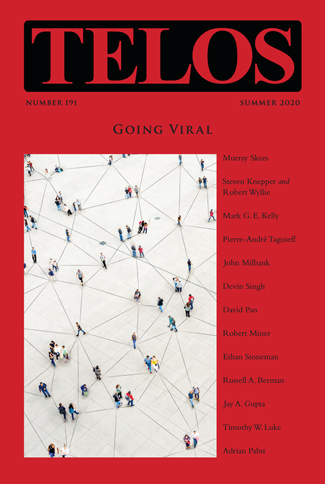 While “going viral” has taken on a new meaning by recuperating an old one, it is the virtual experience that seems to be more enduring. Not only has the pandemic sped up the shifting of human activity onto virtual platforms, but the viral dynamics of social media seem set to outlast the microbial versions: it has turned out to be easier to lock down the Wuhan virus than President Trump’s Twitter feed. Yet in both cases, it is unclear whether it is the actual spread or the fear that is the greater danger. For this fear leads to the call for more authoritarian measures, whether this means censoring Twitter posts or locking down the population. But if viral spread leads to the reassertion of sovereignty, we also come to realize that the freedoms we have taken for granted are in fact the result of a curated space, in which the rules for interaction have always formed the hidden framework within which our lives have unfolded. As these framing conditions come into focus during the crisis, we have the opportunity to reimagine them in such a way as to retrieve sovereignty not as a kind of authoritarian reaction but as an understanding of how our values must inform the boundaries we set. This issue of Telos considers how the experience of going viral has come to dominate our political life as well as how our reflection on this process can free us to consider the alternatives. While “going viral” has taken on a new meaning by recuperating an old one, it is the virtual experience that seems to be more enduring. Not only has the pandemic sped up the shifting of human activity onto virtual platforms, but the viral dynamics of social media seem set to outlast the microbial versions: it has turned out to be easier to lock down the Wuhan virus than President Trump’s Twitter feed. Yet in both cases, it is unclear whether it is the actual spread or the fear that is the greater danger. For this fear leads to the call for more authoritarian measures, whether this means censoring Twitter posts or locking down the population. But if viral spread leads to the reassertion of sovereignty, we also come to realize that the freedoms we have taken for granted are in fact the result of a curated space, in which the rules for interaction have always formed the hidden framework within which our lives have unfolded. As these framing conditions come into focus during the crisis, we have the opportunity to reimagine them in such a way as to retrieve sovereignty not as a kind of authoritarian reaction but as an understanding of how our values must inform the boundaries we set. This issue of Telos considers how the experience of going viral has come to dominate our political life as well as how our reflection on this process can free us to consider the alternatives.
Continue reading →
|
|
 One of the most disappointing human rights debacles in the last few years was the withdrawal of U.S. forces from Afghanistan. For those who still take an interest, the human rights situation there has become horrendous, with Human Rights Watch documenting the denial of schooling and employment to women, extrajudicial killings, and torture. Moreover, in a severe rebuttal to those who supported the withdrawal, Taliban rule has created the conditions for a renewal of terrorist groups that can now develop and train in Afghanistan with impunity. There is also a good case to be made that the U.S. withdrawal there emboldened Putin to invade Ukraine, calculating that the United States and its allies no longer have the stomach for protracted conflicts in order to prevent human rights abuses. It may be that we have traded a low-grade conflict in Afghanistan for a high-intensity one in Ukraine. The lesson here is that the struggle for human rights, while beginning as a moral problem about our common responsibilities, can only be taken seriously when we consider its political ramifications. What do we owe to our fellow humans, and what sacrifices should we make in order to fulfill those responsibilities?
One of the most disappointing human rights debacles in the last few years was the withdrawal of U.S. forces from Afghanistan. For those who still take an interest, the human rights situation there has become horrendous, with Human Rights Watch documenting the denial of schooling and employment to women, extrajudicial killings, and torture. Moreover, in a severe rebuttal to those who supported the withdrawal, Taliban rule has created the conditions for a renewal of terrorist groups that can now develop and train in Afghanistan with impunity. There is also a good case to be made that the U.S. withdrawal there emboldened Putin to invade Ukraine, calculating that the United States and its allies no longer have the stomach for protracted conflicts in order to prevent human rights abuses. It may be that we have traded a low-grade conflict in Afghanistan for a high-intensity one in Ukraine. The lesson here is that the struggle for human rights, while beginning as a moral problem about our common responsibilities, can only be taken seriously when we consider its political ramifications. What do we owe to our fellow humans, and what sacrifices should we make in order to fulfill those responsibilities? 






